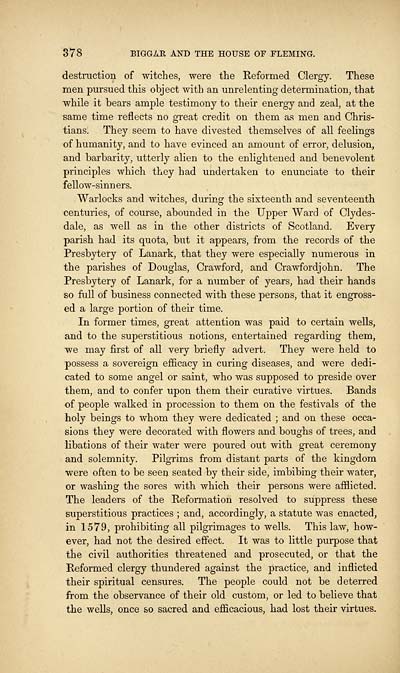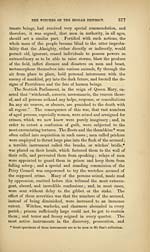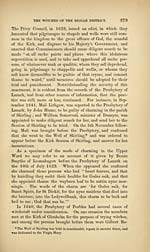Biggar and the House of Fleming
(408) Page 390
Download files
Complete book:
Individual page:
Thumbnail gallery: Grid view | List view

378 BIGGAR AND THE HOUSE OF FLEMING.
destruction of witches, were the Reformed Clergy. These
men pursued this object with an unrelenting determination, that
while it bears ample testimony to their energy and zeal, at the
same time reflects no great credit on them as men and Chris-
tians. They seem to have divested themselves of all feelings
of humanity, and to have evinced an amount of error, delusion,
and barbarity, utterly alien to the enlightened and benevolent
principles which they had undertaken to enunciate to their
fellow-sinners.
Warlocks and witches, during the sixteenth and seventeenth
centuries, of course, abounded in the Upper Ward of Clydes-
dale, as well as in the other districts of Scotland. Every
parish had its quota, but it appears, from the records of the
Presbytery of Lanark, that they were especially numerous in
the parishes of Douglas, Crawford, and Crawfordjohn. The
Presbytery of Lanark, for a number of years, had their hands
so full of business connected with these persons, that it engross-
ed a large portion of their time.
In former times, great attention was paid to certain wells,
and to the superstitious notions, entertained regarding them,
we may first of all very briefly advert. They were held to
possess a sovereign efficacy in curing diseases, and were dedi-
cated to some angel or saint, who was supposed to preside over
them, and to confer upon them their curative virtues. Bands
of people walked in procession to them on the festivals of the
holy beings to whom they were dedicated ; and on these occa-
sions they were decorated with flowers and boughs of trees, and
libations of their water were poured out with great ceremony
and solemnity. Pilgrims from distant parts of the kingdom
were often to be seen seated by their side, imbibing their water,
or washing the sores with which their persons were afflicted.
The leaders of the Reformation resolved to suppress these
superstitious practices ; and, accordingly, a statute was enacted,
in 1579, prohibiting all pilgrimages to wells. This law, how-
ever, had not the desired effect. It was to little purpose that
the civil authorities threatened and prosecuted, or that the
Reformed clergy thundered against the practice, and inflicted
their spiritual censures. The people could not be deterred
from the observance of their old custom, or led to believe that
the wells, once so sacred and efficacious, had lost their virtues.
destruction of witches, were the Reformed Clergy. These
men pursued this object with an unrelenting determination, that
while it bears ample testimony to their energy and zeal, at the
same time reflects no great credit on them as men and Chris-
tians. They seem to have divested themselves of all feelings
of humanity, and to have evinced an amount of error, delusion,
and barbarity, utterly alien to the enlightened and benevolent
principles which they had undertaken to enunciate to their
fellow-sinners.
Warlocks and witches, during the sixteenth and seventeenth
centuries, of course, abounded in the Upper Ward of Clydes-
dale, as well as in the other districts of Scotland. Every
parish had its quota, but it appears, from the records of the
Presbytery of Lanark, that they were especially numerous in
the parishes of Douglas, Crawford, and Crawfordjohn. The
Presbytery of Lanark, for a number of years, had their hands
so full of business connected with these persons, that it engross-
ed a large portion of their time.
In former times, great attention was paid to certain wells,
and to the superstitious notions, entertained regarding them,
we may first of all very briefly advert. They were held to
possess a sovereign efficacy in curing diseases, and were dedi-
cated to some angel or saint, who was supposed to preside over
them, and to confer upon them their curative virtues. Bands
of people walked in procession to them on the festivals of the
holy beings to whom they were dedicated ; and on these occa-
sions they were decorated with flowers and boughs of trees, and
libations of their water were poured out with great ceremony
and solemnity. Pilgrims from distant parts of the kingdom
were often to be seen seated by their side, imbibing their water,
or washing the sores with which their persons were afflicted.
The leaders of the Reformation resolved to suppress these
superstitious practices ; and, accordingly, a statute was enacted,
in 1579, prohibiting all pilgrimages to wells. This law, how-
ever, had not the desired effect. It was to little purpose that
the civil authorities threatened and prosecuted, or that the
Reformed clergy thundered against the practice, and inflicted
their spiritual censures. The people could not be deterred
from the observance of their old custom, or led to believe that
the wells, once so sacred and efficacious, had lost their virtues.
Set display mode to:
![]() Universal Viewer |
Universal Viewer | ![]() Mirador |
Large image | Transcription
Mirador |
Large image | Transcription
Images and transcriptions on this page, including medium image downloads, may be used under the Creative Commons Attribution 4.0 International Licence unless otherwise stated. ![]()
| Histories of Scottish families > Biggar and the House of Fleming > (408) Page 390 |
|---|
| Permanent URL | https://digital.nls.uk/94844178 |
|---|
| Description | A selection of almost 400 printed items relating to the history of Scottish families, mostly dating from the 19th and early 20th centuries. Includes memoirs, genealogies and clan histories, with a few produced by emigrant families. The earliest family history goes back to AD 916. |
|---|

